Team for Theatrical Jazz Creation Lab 2025
Stephanie Leigh Batiste– UCSB Professor & Director of the Hemispheric South/s Director

Stephanie Leigh Batiste is an Associate Professor of Black Studies and English at UCSB, where she is also Affiliate Professor in the Departments of Theater and Dance and Comparative Literature. Dr. Batiste served as the Acting Chair of the UCSB Black Studies Department from 2011-2012, was a Co-PI on the Consortium for Black Studies programming and research grant from 2015-2018, and currently serves as the Director of the Hemispheric South/s Research Initiative. Dr. Batiste is a poet, performer, and playwright. Her poems have been published in The Current and Foundry. Her solo show Stacks of Obits and plays Blue Gold & Butterflies, and Young Love Found & Lost: 6 poems in a circle have been performed nationally and internationally. Notably, she received a LA Creation Residency at the Bootleg Theater for Blue Gold & Butterflies.
Sophia Barrios- UCSB English Undergrad & “Chorus”
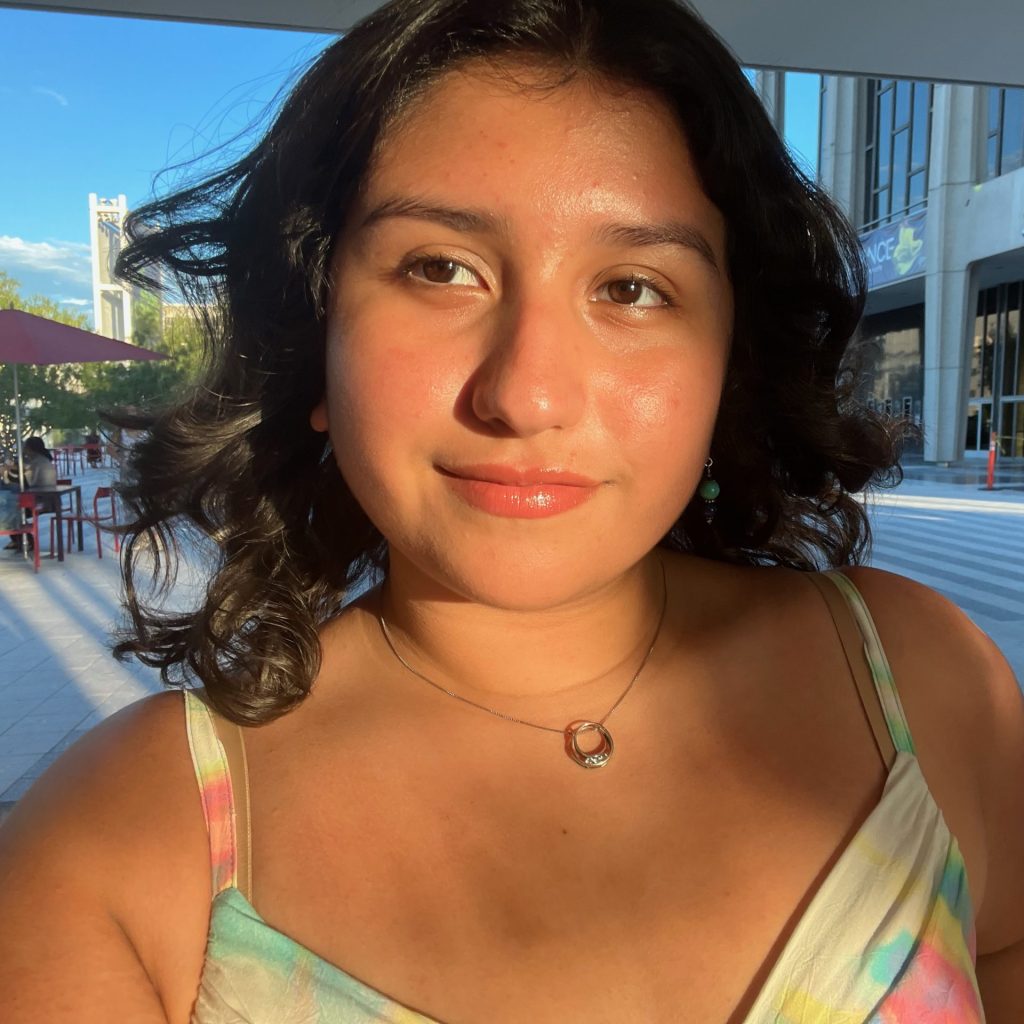
Dr. Dasha Chapman- UCSB Professor & Choreography
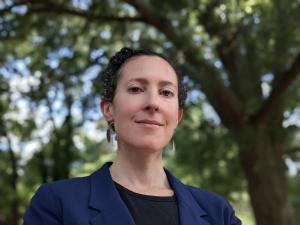
Dasha A. Chapman is an interdisciplinary dancer-scholar whose research, teaching, curation, and performances interweave a nexus of Haitian, Caribbean, and Black studies, critical dance and performance studies, ethnography, queer/gender studies, and embodied practice. Dr. Chapman’s current monograph, Grounding Practice: Dancing Haiti on Tè Glise, is a multi-sited ethnography that follows the artistry of six Haitian dance pedagogues to show how their teaching and learning of Haitian dance became a powerful counter-hegemonic placemaking practice after the 2010 earthquake. Dr. Chapman’s solo and co-authored writing has been published in Americas: a Hemispheric Music Journal, The Black Scholar, The Dancer-Citizen, Dance Chronicle, Journal of Haitian Studies, Kalfou: A Journal of Comparative and Relational Ethnic Studies, Performance Matters, Radical Teacher, Theatre Journal, and Women & Performance. Currently she is co-editing with Mamyrah Dougé-Prosper and Mario LaMothe a special issue of the Journal of Haitian Studies on “The Rights to Live Creatively.” Dr. Chapman’s artistic work is collaborative and place-based. Since 2015, she has devised multidisciplinary performances with Haitian and American artists to activate hxstories, places, and dis/orientations. Dr. Chapman also co-convenes three transdisciplinary initiatives: the Haitian Studies Association’s Sexualities Working Group, Afro-Feminist Performance Routes, and Un/Commoning Pedagogies Collective. Dr. Chapman received her Ph.D. in Performance Studies and an M.A. in Humanities and Social Thought from New York University. She previously held positions at Duke University, Hampshire College/Five Colleges, Davidson College, and Kennesaw State University.
N. Fadeke Castor- Assistant Professor of Religion and Africana Studies at Northeastern University, “Chorus”

N. Fadeke Castor (she/they) is a Black Feminist ethnographer and African diaspora studies scholar, with research and teaching interests in religion, race, performance and the intersectional politics of decolonization. As a Yorùbá Ifá initiate of Trinidadian heritage they are inspired by African spiritual engagements with Black liberation imaginaries and the Black radical tradition. She is the author of Spiritual Citizenship: Transnational Pathways from Black Power to Ifá in Trinidad (Duke University Press, 2017; Clifford Geertz Prize, 2018), which centered the Ifá/Orisha religion in the Black radical tradition and Trinidad’s Black Power revolution to illuminate practices and performances of decolonization in the post-colonial Caribbean. Their writings can be found in Cultural Anthropology, Fieldwork in Religion, Tarka, and The Black Scholar. Her current research focuses on an exploration of the spiritual ontologies and epistemologies of Black spiritual praxis as shifting our centers of being and ways of knowing towards collective care, healing, and social transformation. As part of this larger project they are building Digital Ancestral Altars: Remembrances of Trinidad Ifá/Orisha Elders (funded by a Community Stories grant from The Crossroads Project, Princeton University), a digital multi-modal repository and archive, to commemorate Trinidad’s ancestral Ifá/Orisha elders.
Grisha Coleman- Northwestern Professor & Movement Vocabulary
Grisha Coleman is a time-based artist working in performance and experiential media. Her work explores relationships between physiological, technological and ecological systems. As faculty at Arizona State University, she holds the position of associate professor of movement, computation and digital media in the School of Arts, Media and Engineering, with affiliations in Schools of Dance and the Design. Her art and scholarly work, echo::system, is a springboard for re-imagining the environment, environmental change, and environmental justice. Her research in movement and somatic methods informs her teaching as well as supporting transdisciplinary research; she is a member of The International Somatic Movement Education & Therapy Association (ISMETA), and works with modalities of Body-Mind Centering ™ and The Feldenkrais Method™.
Dr. Margit Edwards- Theater Arts Lecturer at University of Pennsylvania, “Chorus”
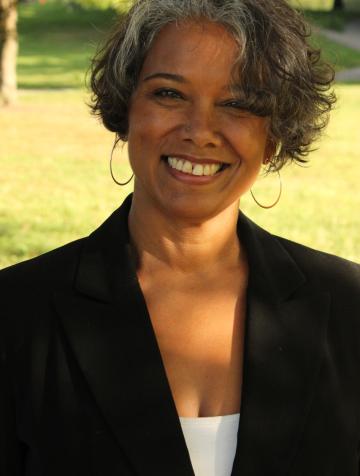
Dr. Margit Edwards, Lecturer in the Theatre Arts Program at the University of Pennsylvania, received her doctorate in Theatre and Performance at The Graduate Center, CUNY. Her doctoral dissertation, titled The Village on the Stage: Dramaturgies of Modernity in African Dance (2024), is grounded in her current research interests in 20th & 21st century Africana theatre and performance, theories of coloniality and modernity, diaspora studies, and transcultural dance dramaturgy. She holds a Master of Arts degree in Dance Ethnography from UCLA and a Master of Fine Arts in Experimental Choreography from UC Riverside. In addition to her experience as an actor and director, Dr. Edwards has been a dancer and choreographer with Viver Brasil Dance Co, and an arts educator and administrator with artworxLA (The HeArt Project). She is currently a member of the collective of artists, scholars, and cultural activists that is Contours: Arte Calle. Recent publications: “Dancing Orixa Dolls/Dolls of Axé: Honoring the artistry of Dona Detinha de Xango,” in Contours: Arte Calle Edition 2: Traveling Diasporas, forthcoming October 2024, contours.lib.umn.edu; and “African Performance in the Feast of St. Francis Xavier in 17th century Luanda, Angola” in The Routledge Companion to African American Theatre and Performance (2018).
Lexxus Edison- English PhD Student, Graduate Student Organizer, “Girl”
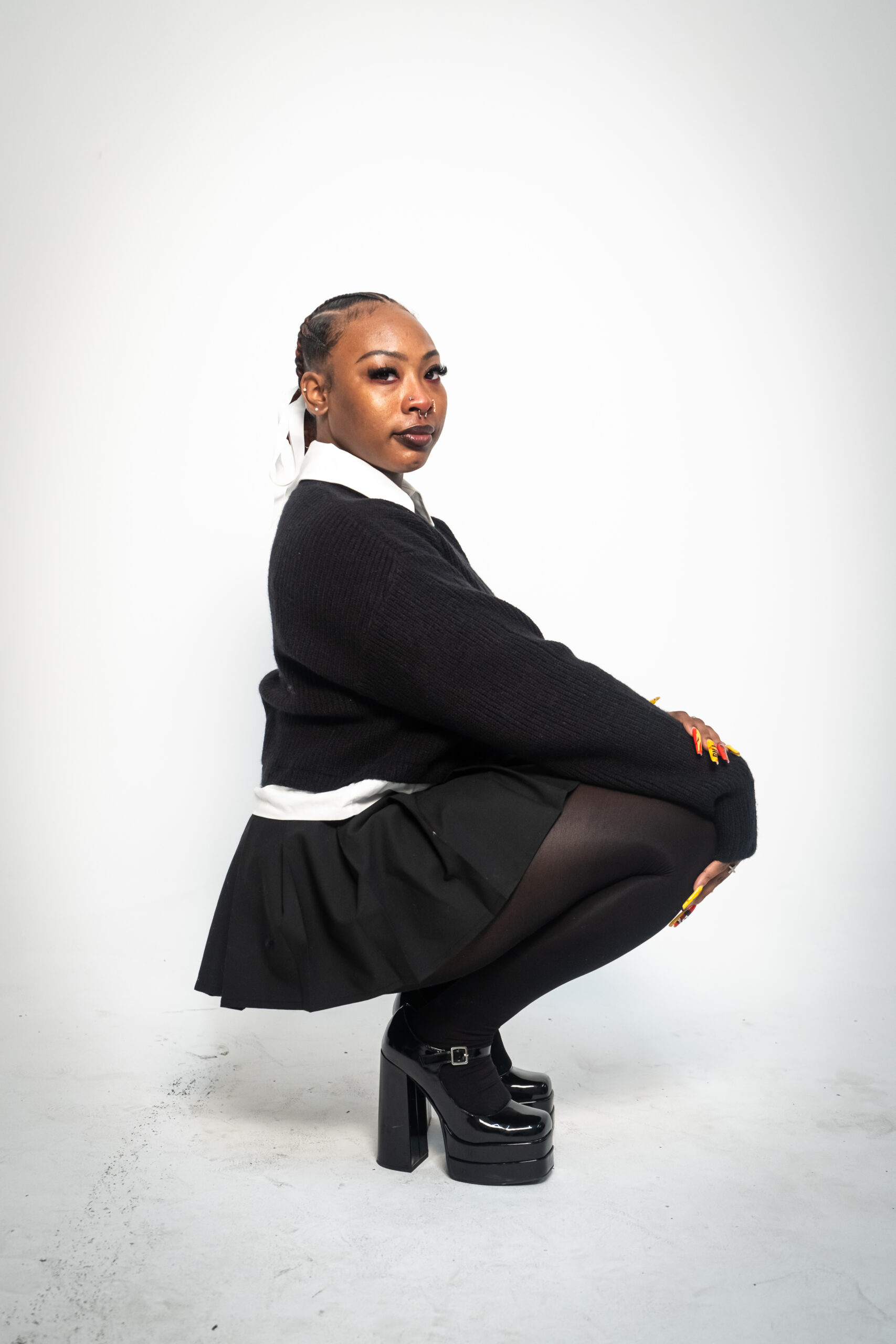
Lexxus Edison is a sixth-year graduate student at UC Santa Barbara in the English PhD program pursuing an emphasis in Black Studies. Lexxus’s research areas include African American Literature and Culture, Black Performance Studies, and Creative Writing. Her research examines 20th-21st century African American autobiographies forms exploring black debt; she reads how the black autobiography ruptures both the form of autobiography and the notion of debt. She is very committed to her community and the work she engages in; she has served as a graduate intern for Office of Black Student Development (OBSD), TA for Black Studies and English, a co-chair for the Committee of Graduate Students (CoGS) in the English Department, The Catalyst Research Assistant, and a Research Assistant for Hemispheric South(s).
Iyatunde Folayan- Performance Artist, Community Builder, lndependent Filmmaker, “Marie”
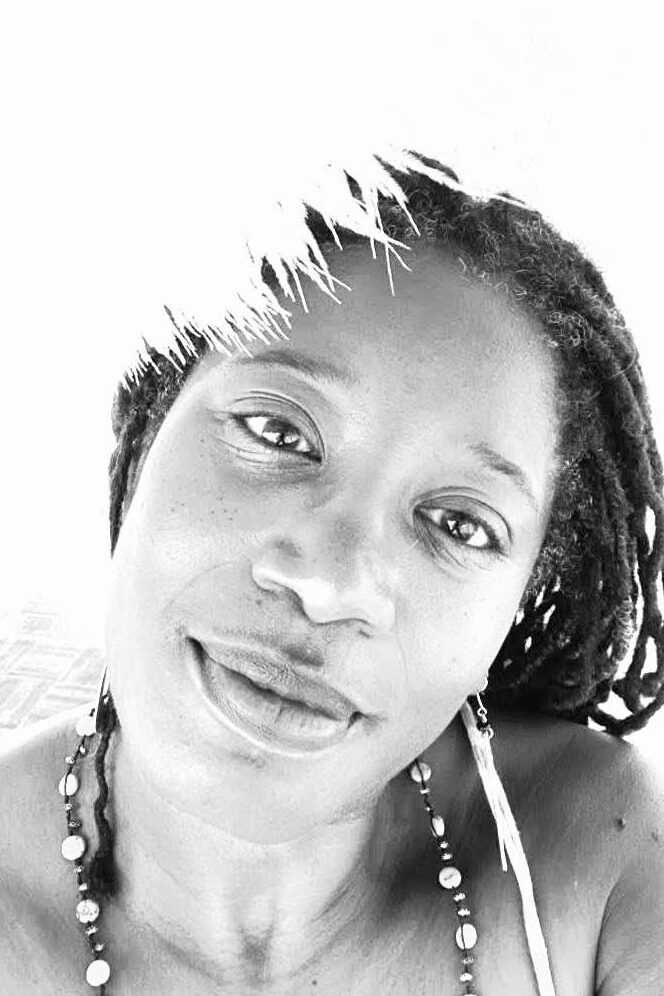
Iyatunde Folayan is an Afroqueer artist and native of Detroit based in Los Angeles. Iyatunde cut her teeth as an independent filmmaker in New York learning experimental film at Third World Newsreel in the 90s. She was grateful to work on A Litany for Survival: The Life and Work of Audre Lorde. In LA, she has worked as a performance artist with Great Leap, Teatro Q and at Highways Performance Space. Iyatunde is developing a play called Saviour and is now a caregiver for her mom, Pat. With a firm grounding in African spirituality, reverence for the Black radical tradition and a penchant for Queer rebellion, she believes artists play a key role in the liberation of the oppressed and their work must tell the tale.
Daniel Alexander Jones- Artist as Energy & Guest Workshop Director
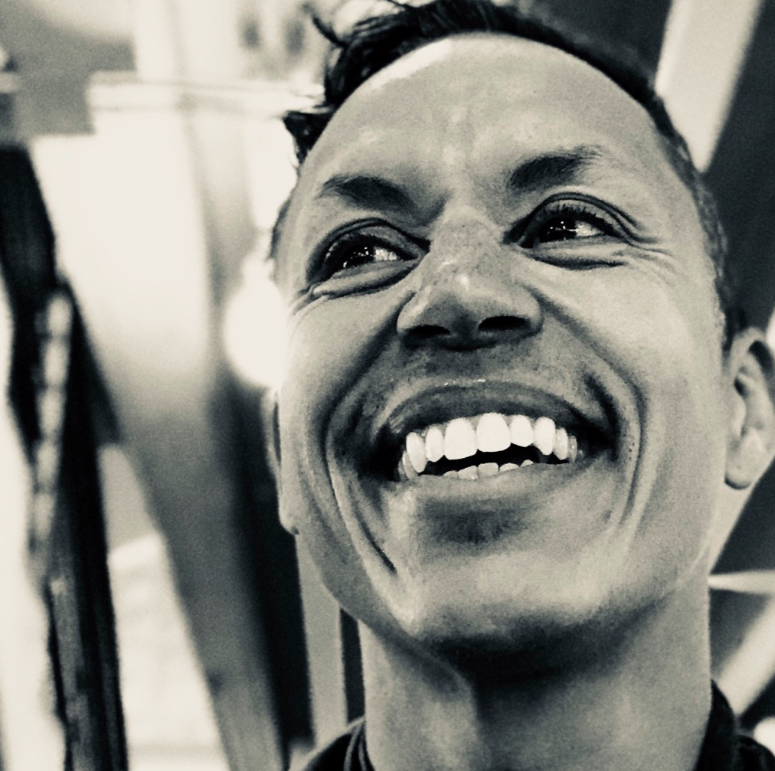
Daniel Alexander Jones exemplifies the artist-as-energy worker. His wildflower body of original work includes plays, performance pieces, recorded music, concerts, music theatre events, essays, and long-form improvisations. He explores the esoteric and the everyday through his own distinctive dramaturgy. Jones’s critically-acclaimed pieces include Radiate (Soho Rep and National Tour; Black Light(Public Theater, Greenwich House Theatre, American Repertory Theatre, Penumbra Theatre); Duat (Soho Rep); An Integrator’s Manual (La MaMa, etc. and Fusebox Festival). Jones has recorded six albums of original songs as his alter-ego, Jomama Jones. Daniel’s current project, www.aten.life, significantly expands his digital media presence. He has been a part of arts communities in New York City, Minneapolis/St. Paul, Austin, Boston, and Los Angeles, where he bases his practice. He is a widely respected, innovative educator who has taught across the United States and held faculty positions at Goddard College, The University of Texas at Austin, and most recently at Fordham University, where he is a Full Professor in the Department of Theatre and Visual Art
Michael Andrew Parra- UCSB English PhD Student and “Chorus”
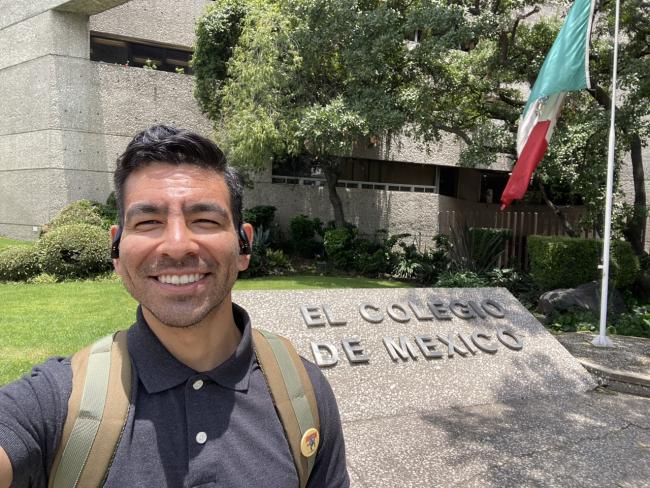
His doctoral research broadly centers on the tensions between empirical reality, world-making, and identity formation as part of a critical masculinity studies analysis of cultural productions from the Americas produced by male authors and about men who just so happen to desire homosocial intimacies. That is, he examines both gay (open and not) as well as a broad array of male cultural workers who exist and/or navigate along a complex sexual continuum between 1940 – 2001. His doctoral dissertation investigates how this multi-national yet hemispherically conscious archive from Argentina, Chile, Cuba, El Salvador, Haiti, México, and the United States names and subverts the heteropatriarchal symbolic economies of national(ist) literatures. Significantly, while male-male sex is figured as antithetical to the nation-state that is anthropomorphized in the form of a hypermasculine and presumably straight warrior hero and other archetypes, these authors trouble the very basis of the nation-state. Carnalerotics argues that queered ostensibly non-gay and gay male bodies are arrivant states that, too, emerge as legible alongside the rise of the nation-state in the Americas. Like the nation-state, the vexed status of these queered ostensibly non-gay gay male bodies emerge from colonialism and empirically negotiate the quotidian racial, gender, sex, and sexuality hierarchies left by the legacy of Christian, European, and heteropatriarchal coloniality.
Prof. Matt Richardson- UCSB Professor & Dramaturg
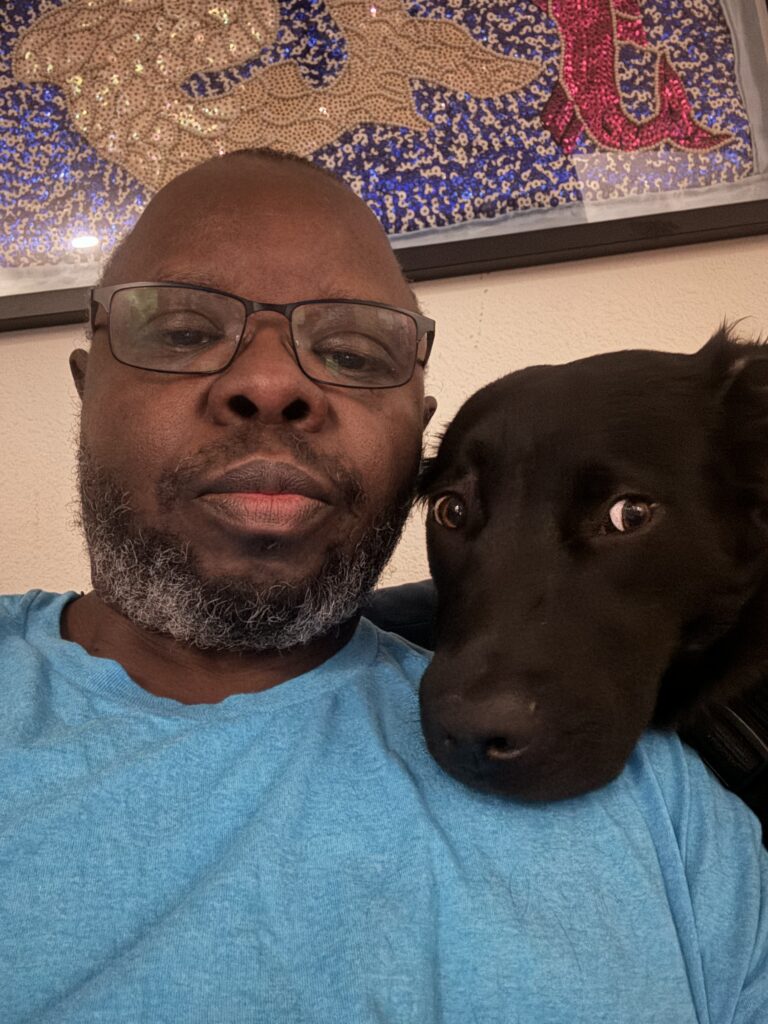
Matt Richardson is an Associate Professor in the Department of Feminist Studies at UCSB. He is a cultural critic, literary scholar and fiction writer. He has also an alumnus of the people of color feminist performance group, The Austin Project.
Talia Sampson- UCSB Psychology & Brain Studies & “Chorus”
Saide Singh- UCSB English PhD student and Graduate Student Organizer

Saide Kamille Singh (she/her) is a third year PhD student in the English Department at the University of California, Santa Barbara. Her doctoral research seeks to understand the convergence that occurs when we consider the criticality of diachronic Caribbean food histories alongside the culinary agencies offered by the African and Indian descendent Caribbean women who have grown, cooked, and narrativized food. In her efforts to support the Caribbean intellectual community at UCSB, she also devotes her time to being the Research Assistant for the Caribbean Studies Research Focus Group and the Hemispheric South/s Research Initiative.
Inyosi Sebenzekhaya (Dr. Nia O. Witherspoon)
Multidisciplinary Artist + Holistic Health Practitioner + “Eloise”
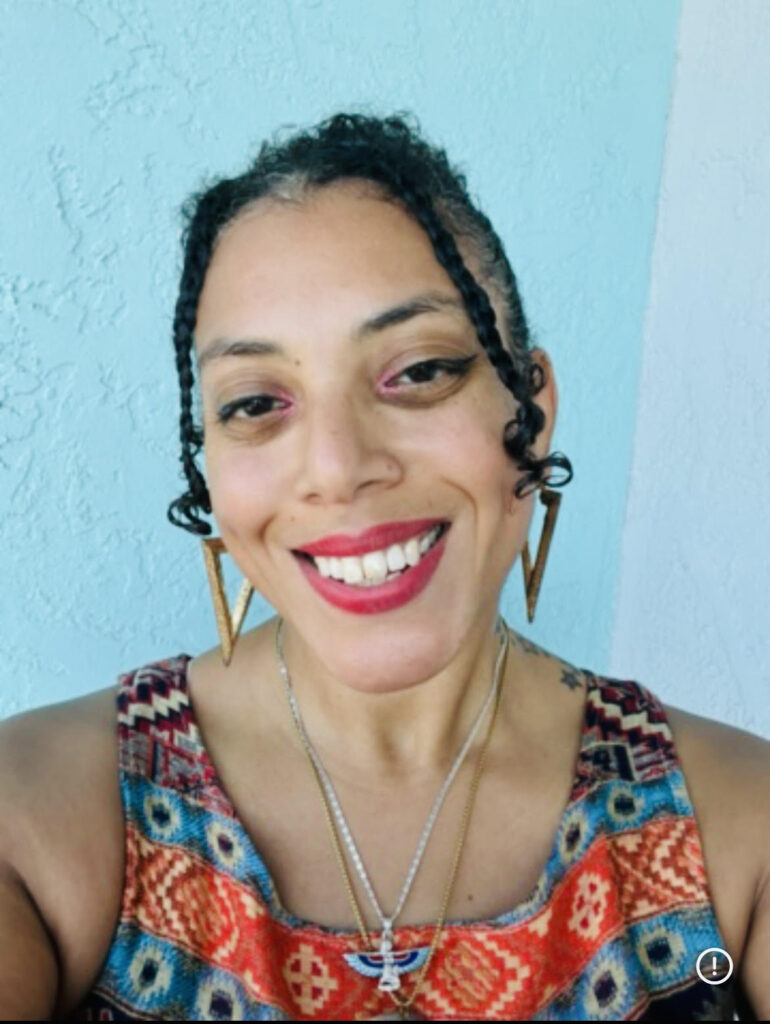
Inyosi Sebenzekhaya (Dr. Nia O. Witherspoon) is the daughter of Marcia Ostrow and Anton Witherspoon. Her medicine flows through her as a writer, ritual-performance maker, song channel, womb-tender and bodyworker, dreamer, creative doula, and Kundalini Yoga teacher–a conjuror, a weaver, a shaper, a nurturer, and a creator supporting mental, physical, and spiritual health by way of deep transformation. Ancestrally guided through the Afro-Indigenous teachings of the Ubungoma lineage, and called to be of service since childhood, Inyosi is a deep listener, an empath, and a natural care-giver. A Black queer multidisciplinary artist + healing justice practitioner Inyosi is most inspired while tapping into the metaphysics of love and aesthetics of care in the practice of the radical ecology and imagination that is our birthright as humans. Combining Black feminism and ecocriticism with mediums in writing, technology, ritual-performance, sound, and installation, Witherspoon creates decolonial portals for communion, witnessing, and reconnection with the Divine, the Plant and Animal Family, and the Ancestral. Recent works include: Priestess of Twerk: A Black Femme Star Temple + Wisdom School (HERE Arts Center, 2024), Chronicle X: The Dark Girl Chronicles (The Shed, 2021), and MESSIAH (La Mama, 2019). She is a recipient of the Tow Fellowship, NEFA/NTP, NPN Creation + Touring Fund, NYSCA, Creative Capital, Jerome New Artist Fellowship, HARP, and residencies at Sitka Center for Art and Ecology, Marble House, Jacob’s Pillow, Musical Theatre Factory, Brooklyn Arts Exchange, and New York Theatre Workshop. Her work has been featured by Irondale, Theatre MITU, Mercury Store, The Bushwick Starr, BRIC, Oregon Shakespeare Festival, Joe’s Pub, JACK, La Mama ETC, Playwright’s Realm, Links Hall, National Black Theatre, Brava Theatre, BAAD, Movement Research, Painted Bride, and elsewhere. Her writing is published in the Journal of Popular Culture, Imagined Theatres, Women and Collective Creation, and IMANIMAN: Poets Writing in the Anzaldúan Borderlands. She has held creative and academic appointments at BerkleeNYC, Williams College, Fordham University, University of Massachusetts, Florida State University, and Arizona State University. She is currently building the foundation to Oshun’s Palace, a full-spectrum menu of ceremonial services for holistic health, birthkeeping, womb-tending, and Ayurvedic + Afro-feminine beauty. Her first book, THE DARK GIRL CHRONICLES: A Trilogy will be released in Fall 2025. www.niawitherspoon.com.
brooke smiley- UCSB Professor + Production Director

brooke smiley is an indigenous dance and somatic movement artist living in California. Her work engages a deepening of awareness in the body, with a dedicated practice of interdisciplinary research in educational, choreographic, sculptural, and healing capacities. An advocate for Other, brooke guides choice, agency and freedom in the body, promoting diversity and inclusion in community, be it in performance, workshops, or installations. With a strong background in earth architecture, social, indigenous, and environmental activism, brooke makes accessible experiential anatomy and sustainable building practices to all people
Sara Sotelo- UCSB Theater, Dance and Performance Studies MA Candidate and Graduate Student Organizer
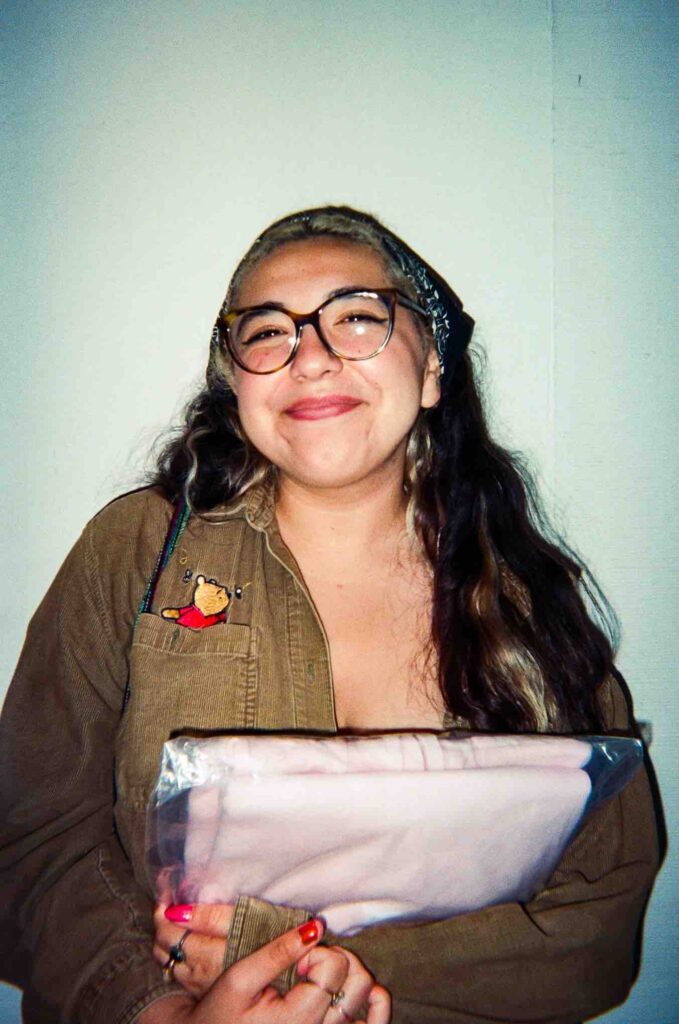
Sara Sotelo (she/her/ella) is a first year MA candidate in the Theater, Dance and Performance Studies Department at UC Santa Barbara. Her research encompasses cultural studies through monsters in performance and pop culture. Sara has been a dramaturg for about 4 years now working on productions such as classics like Rosencranz and Guildenstern are Dead by Tom Stoppard and The Curious Incident of the Dog in the Night-Time by Simon Stephans and new works such as Smoked Out: Watching Them Scrape Our Homes Away by Carl Erez and Unibeauty and Her Wicked Daughters by Frances Ya-Chu Cowhig. She received her BA in History and her BA in Education from the UC Santa Cruz in 2023 (Go Slugs!). While there she worked with many incredible artists who drove her love of theater to new heights and ultimately helped her get here. A Los Angeles county native, her community is what she strives to make proud and continue to help in her own unique way.
Rhaechyl Walker- Actor/Dancer, “Ruby”
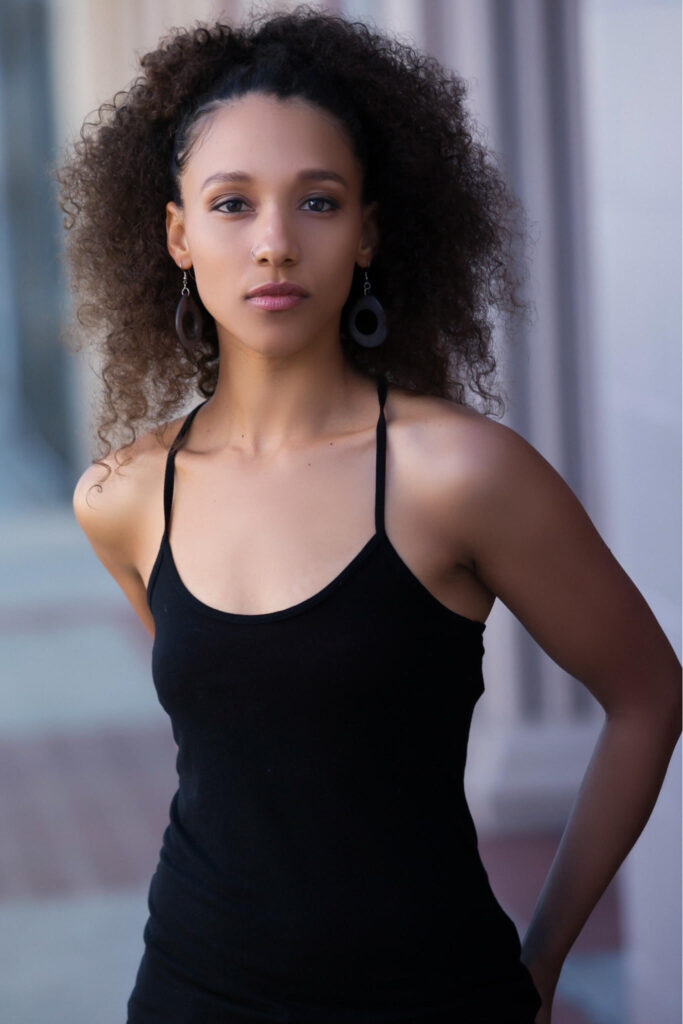
Rhaechyl Iyhlne Walker was born in Los Angeles California. She first graced the stage at age seven as a dancer in the popular musical Alice in Wonderland at a local theater. She has performed in countless plays, dance shows/groups, and musicals throughout her entire grade school and college career. After graduating from UC Riverside with a BA in Theater and English Rhaechyl went on to perform in about a dozen music videos and became the lead actress in a hit play called Dreamscape, where she developed and established the role of Myeisha. Dreamscape toured around the US and in parts of Eastern Europe over the course of five years. Rhaechyl’s first film debut was the lead role of Myeisha in the independent film “My Name Is Myeisha”. You can also spot her in the feature film “Looks that Kill” in the role of Valencia.
Mariah Webber- UCSB Feminist Studies PhD Student & “the deities”
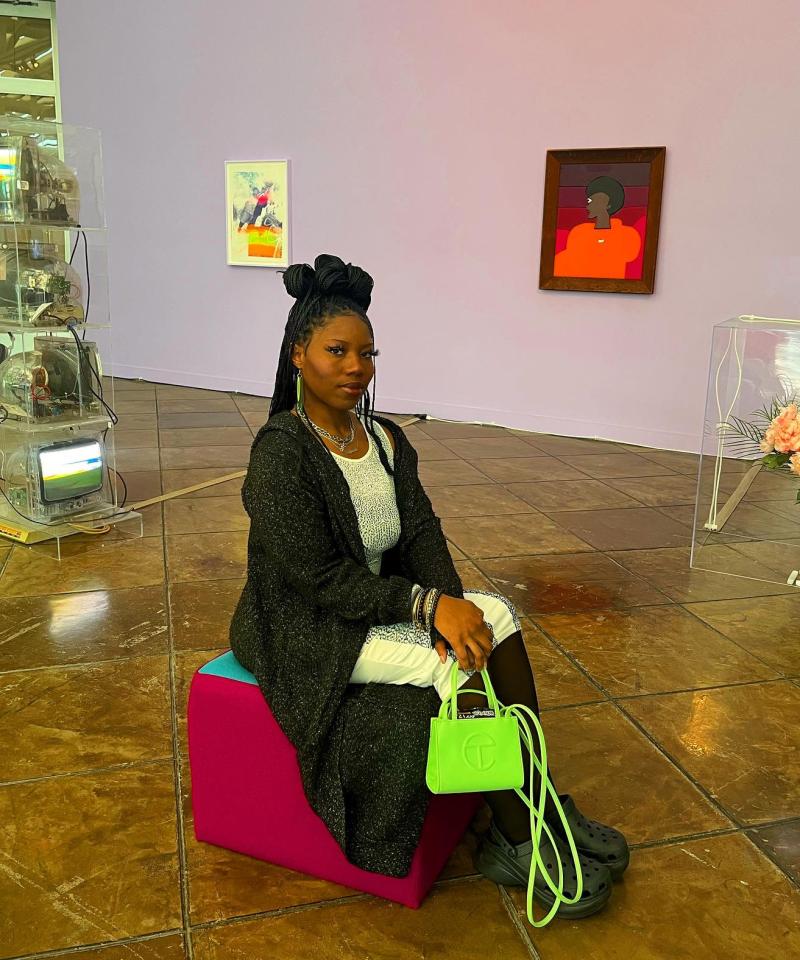
Mariah Webber, M.A. is a writer, educator, artist, poet, diviner & descendant of southern sharecroppers born and raised in Waco, North Carolina. She received a bachelor’s in Psychology from Appalachian State University in 2015 and a Master’s in Sociology from the University of North Carolina at Charlotte in 2017. Currently, Mariah is a fourth-year doctoral student of feminist studies at the University of California at Santa Barbara as a Eugene Cota-Robles scholar. Mariah believes that freedom does not lie within the academy however, she is often curious about the exploration of black erotics, spiritualities, stylistic technologies, and intracommunal methods of healing through the lense of womanism and black queer feminisms. Mariah’s work has been published in Sistories: A Literary Magazine (2019, 2021) and Becoming Undisciplined (2019).
Dr. Hershini Young- UT Austin Professor & Guest Scholar
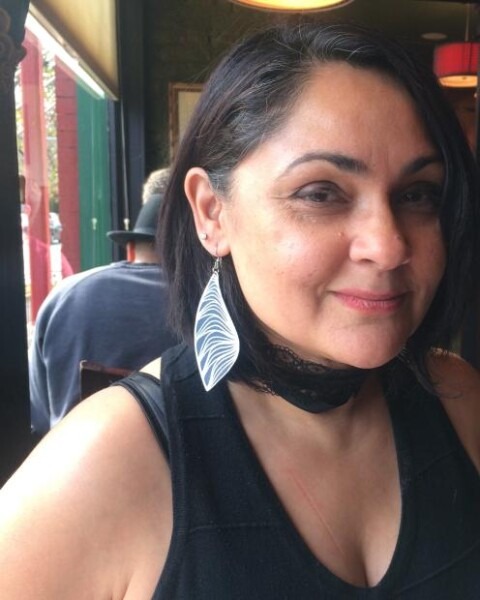
I am current working on book tentatively titled ‘Receiving the Wreck: Black Sociality and the Materiality of Salvage”. In it I examine issues around shipwrecks, the Mediterranean and forensics.